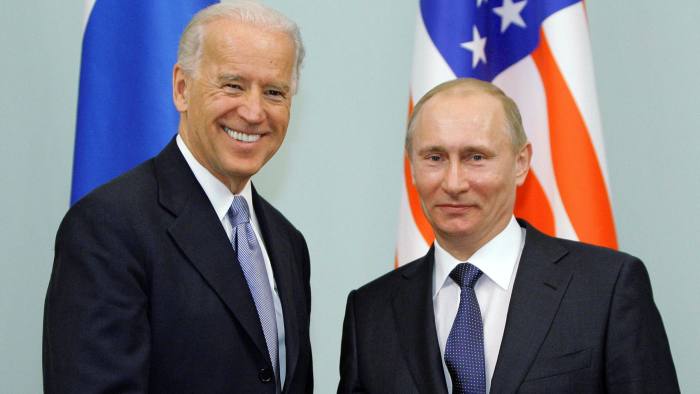Future of US-Russia Relations
February 23, 2021
Of President Joseph R. Biden Jr.’s many promises, he has pledged to counter authoritarianism during his term. During his first phone call with Russian premier Vladimir Putin, Biden noted that America would not tolerate cyber-espionage and interference in elections. Relations between the two countries had been fractured in the recent decades for a variety of reasons. Many bilateral problems arise from conflicts that both countries take different positions on; not surprisingly, this era of Russo-Western tensions is becoming known as the Second Cold War.
To start off this year, Biden and Putin extended the treaty that would reduce both countries’ nuclear arsenals. The New Strategic Arms Reduction Treaty (New START) deal would be in effect for the next five years, with the intent to prevent a new arms race between America and Russia. Although this step has been viewed as positive, there are many hurdles on the way to establishing peace. Putin’s 2018 animated video of intercontinental ballistic missiles hitting Florida is an example of Russia’s constant testing of nuclear weapons and the fragility of these relations. Furthermore, the 2021 extension cannot solely stop competition between these countries and does not limit either nations’ stockpiles of inactive armaments. Destabilizing activities will not be completely prevented and there are no constraints on the current or planned developments of nuclear weapons that will not be deployed.
US-Russia affairs have been strained after the SolarWinds cyberattack, bounties being placed on U.S. soldiers in Afghanistan by the Kremlin, and supporting Syria’s Bashar al-Assad along with Nicolas Maduro’s regime in Venezuela. Russia is deemed one of the top threats to America’s national security and poses many dangers especially since Russia’s 2016 interference in US voting processes. With numerous falsified elections that kept bunker-ridden Putin in power, many Russian citizens are being stripped of freedoms. It is no secret that the Kremlin is responsible for killing some of Putin’s adversaries; his administration rejects all accusations despite the undeniable evidence. United Russia, the Russian nationalist party that embraces Putin’s policies, has enforced his agenda and smothered out allegations of fraud and bribery. This party has been responsible for bridling freedom of speech and has been dubbed “the party of crooks and thieves.” United Russia dominates their nation’s politics and makes many decisions that imperil institutions of democracy worldwide.
With the recent poisoning and incarceration of Russian opposition leader Alexei Navalny, the White House has taken measures to back Russian dissidents. Navalny’s imprisonment has spurred nationwide protests in Russia that took place since January, featuring hundreds of thousands of people, over 3,000 of which have been detained. Many have been locked in police vans for hours on end while rampant human rights abuses ensued; these occurrences have sparked Western concerns and sanctions. Navalny’s recent documentary of “Putin’s Palace” in Gelendzhik has incited civil unrest in Russia after the public caught a glimpse of their kleptocracy. This Cape Idokopas residence has been built on taxpayer rubles and stands as a monument to corruption. Navalny is the Kremlin’s largest foe and has struck fear into Russia’s top oligarchs that embrace their neo-feudalistic society. Navalny’s arrest has ignited a reaction and many EU countries have expelled Russian diplomats.
In an effort to defend global democracy, Biden promised to support Ukraine since Russia illegally annexed Crimea in 2014. Putin had violated the 1975 Helsinki Accords, the 1991 Belavezha Accords, the 1994 Budapest Memorandum, and many other treaties by invading Ukrainian territory. The denuclearization of Ukraine and its opposition to join NATO was seen as a green light for Putin to also occupy eastern territories of this post-Soviet nation. The 2014 exile of corrupt Ukrainian leader, Viktor Yanukovich during the Euromaidan revolution also fueled pro-Russian sentiments that have ultimately resulted in bloodshed. The ongoing war in eastern Ukraine has claimed the lives of thousands and caused the 2014 downing of Malaysia Airlines Flight 17. After international outrage, American forces have been deployed in Ukraine to guard against separatists and Russian terrorism. War zones along the Russia-Ukraine border may look forward to American troops arriving to provide more aid. Biden and Ukrainian president Volodymyr Zelenskiy have been negotiating strategies to combat the aggression that plagues these eastern European nations.
Hopefully, the West’s leniency and inactivity towards Russian hostility will begin to end. Biden’s demonstrative approach signals for more aggressive sanctions and foreign policies against the Russian Federation. However, there are several complications; the EU’s fossil fuel imports from Russia are one of the many challenges for severing ties with this autocratic nation and building a stronger Western unity. World leaders must understand that disregarding Putin’s military actions may be similar to Hitler’s Munich scenario, when Europe avoided confronting Germany’s annexations. Organizations such as NATO want to increase their presence in these conflicts and take a strong stance against these Russian invasions. Western powers have not adequately recognized that Putin’s Russia is not just endangering its own citizens, but that it is endangering the world.



